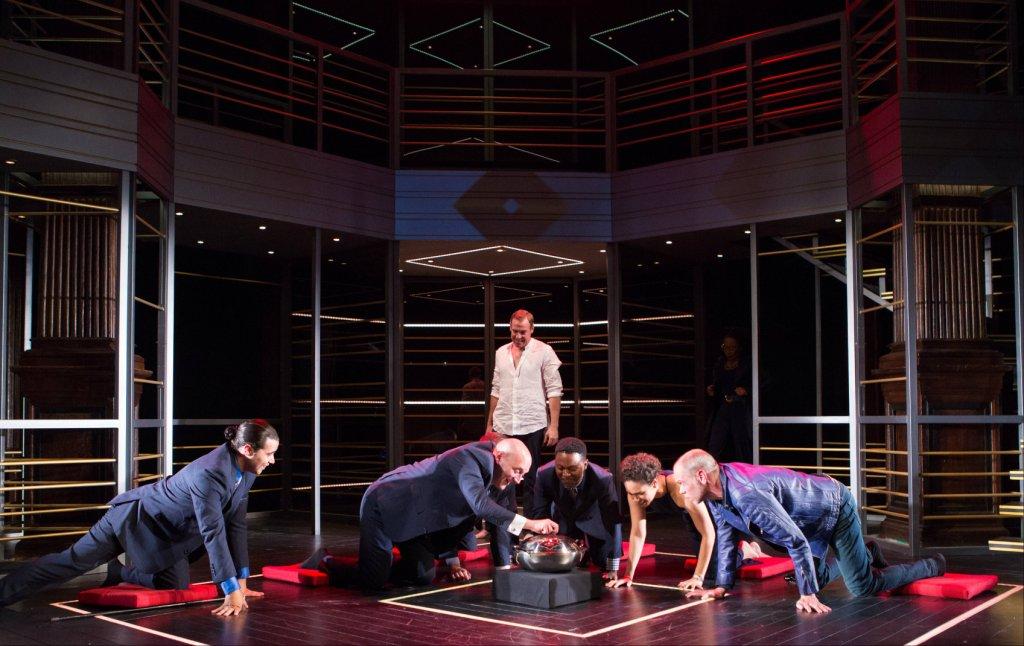When Folger Spotlight last spoke with Resident Dramaturg Michele Osherow, the focus was on the themes and ideas found in Timon of Athens. Today, we explore how Osherow has collaborated with the cast to explore Shakespeare’s language through the rehearsal process.
We’ve talked a bit about how you have been working on the content of Timon of Athens with the cast. What else have you been working with them on?
Particularly with Timon, there is a use of language that is inviting us to read things in a number of ways. One example that comes to mind is this exchange between Timon and Alcibiades:
TIMON
You had rather be at a breakfast of enemies than a dinner of friends.
ALCIBIADES
So they were bleeding new, my lord, there’s no meat like ’em. I could wish my best friend at such a feast.
Alcibiades’ answer can read as either “I like to have my friends with me when I’m enjoying those bloody battles” or “Yes, I love to eat my bloody friends.” And the fact that it can mean both at once is so oddly fitting in this play, which is about consumption of all sorts. There are many references to consumption, even to cannibalism. There’s a playfulness with the language that is begging for these various readings to exist at the same time, and we talk about the possibilities of meaning. But an actor has to make a decision about what the line means to that character in that moment, so we spend a lot of time doing that.

The title page of Timon of Athens, printed in the Second Folio of 1632. Folger Shakespeare Library Digital Image Collection.
How do you navigate those dual meanings?
Something I’ve actually been doing more and more for Timon is going to the Oxford English Dictionary and saying to the actors “Here’s what this word meant in Shakespeare’s day and it also meant this and this and this…” It’s great to see the actors keep exploring words and meanings until they get at the richness of the line. And there’s so much that’s rich in this play. For example, the word “bounty” is all over this play, but there are real differences in potential meanings: virtue? valor? kindness? generosity? a gift? And if you consider that it was a word used to describe gifts given by Gods and (later) sovereigns, what does it mean to apply the term to a man? With Timon and with a lot of other plays, the OED tends to be most helpful because when an actor realizes “Oh I’m saying this?” It’s like a lightbulb.
We’ve also looked at tricky passages and, in fact, much more so on Timon than on other plays, have swapped a few words that really don’t seem to carry much meaning for us. I will usually look at other Shakespeare plays and see how an idea is being conveyed, and even borrow some language. I’ve done that a few times. It’s a fleeting moment for an audience but it makes a big difference to an actor because an actor needs to feel confident that he or she can convey something effectively—actors sometimes worry that they’ll knock people out of the play if audience members have to grabble with usage or meaning of a word. The thinking about Timon is that the play published in the Folio (the only version we have) is incomplete, or a draft of the play. Maybe the play was completed, or maybe the project was dropped. We just don’t know. Thinking about the text in this way makes us more forgiving, I suppose, about some of the inconsistencies or unclear bits. It also frees us to tinker a bit for clarity; I don’t have a lot of guilt about it.
What other plays do you use, when you are finding these passages?
There’s a lot of similarities between Timon and King Lear, a lot of similarities between Timon and Macbeth. The history plays have been helpful, too, because some of the passages we’ve been looking at are about honor, which is a thing that comes up often in the histories.
- Macbeth (Ian Merrill Peakes). Macbeth, Folger Theatre in a co-production with Two River Theater Company, 2008. Photo: Carol Pratt.
- Timon (Ian Merrill Peakes). Timon of Athens, 2017. Photo: Teresa Wood.
- Edgar and Gloucester from the 2007 Folger Theatre and Classical Theatre of Harlem production of King Lear.
It’s been funny, in a way, because we’ll hit a rough or sort of convoluted line of text and we’ll talk about what we think a particular line is about or what the character is trying to express in that moment. And sure enough, I’ll say, “right, Shakespeare’s got a bit on that in X.” More evidence that “there is no new thing under the sun”–though I’m pretty certain Shakespeare didn’t write that one!
 Thanks so much to Michele for speaking with us! Timon of Athens is on stage until June 11. For tickets and more information, visit us online or call the Folger Box Office at 202.544.7077.
Thanks so much to Michele for speaking with us! Timon of Athens is on stage until June 11. For tickets and more information, visit us online or call the Folger Box Office at 202.544.7077.
Stay connected
Enter your email address to follow this blog and receive notifications of new posts by email.






